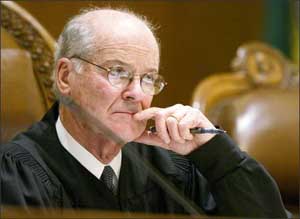-
- ‘God, guns, gays’ a stretch for average voters
- Provincetown straights complain of intolerance among gays
- Conn. lesbian couple files medical malpractice lawsuit
- Wash. same-sex marriage ruling could rock Supreme Court races
- Army dismisses Gay Arabic linguist
- Group touting military equality brings campaign to Virginia
- National News Briefs
- World News Briefs
national
Wash. same-sex marriage ruling could rock Supreme Court races
Governor say she hopes voters won’t politicize the judiciary
Published Thursday, 03-Aug-2006 in issue 971
OLYMPIA, Wash. (AP) – The deeply divided Washington Supreme Court’s decision to retain the state ban on same-sex marriage may roil the already volatile court elections this fall.
Chief Justice Gerry Alexander, who is under attack from the right and from the building industry and others, joined the shaky 5-4 majority. That puts him on the side of public opinion, according to the polls, but might alienate some of his progressive backers, analysts said July 26. Alexander is opposed by attorney John Groen.
Two other justices up for re-election this fall, Susan Owens and Tom Chambers, were among the four dissenters and would have thrown out the state’s same-sex marriage ban, called the Defense of Marriage Act.
Owens already was considered vulnerable and faces a strong challenge from state Sen. Stephen Johnson, R-Kent. Chambers is considered a safe bet for re-election and the case isn’t expected to hurt him much.
Gov. Chris Gregoire, who supports all three justices for re-election, noted that they were on opposite sides of the same-sex marriage question, and said she hopes voters won’t politicize the judiciary.
Still, she expects it to stir up the races, which already were heating up with strongly financed opposition.
“I do think that any opinion of this nature, when you’ve got emotions running so high, is going to have an impact” on elections, Gregoire told reporters.
“I would simply ask our citizens to understand that these people are doing their job as best they can. Whether we agree or disagree with them, we have to respect that they’re doing their job.”
Former Justice Phil Talmadge, one of the state’s top appellate lawyers, said having the decision released just as court campaigns are heating up can’t help but affect the races. Groen and Johnson will gain traction with their backers and Justice Chambers may draw an unexpected challenge, he said. As of July 26, no one had filed against him.
“It will be a major issue for some in the upcoming election,” Talmadge said.
“It’s pretty simple, Politics 101” – that foes of the marriage ban take a hit, said GOP consultant Chris Vance. “Every poll I’ve ever seen, every election on this issue I’ve ever seen around the country, has gone against this.
“It would have been a more powerful issue if it had gone the other way, but for people who feel strongly on either side, some might become single-issue voters on this.”
Tom McCabe, leader of the politically active Building Industry Association of Washington, said Owens clearly took a hit by lining up with a viewpoint that polls show to be overwhelmingly unpopular.
“Over 75 percent of Washingtonians believe that gay marriage is not OK,” he said. “If voters are educated about how judges voted on this, they would be less likely to vote for Susan than before they found out that information.”
He said Alexander might get criticized by both sides.
On the other side of the coin, Hugh Spitzer, a former candidate for the high court and currently an attorney and constitutional law professor, said having the law upheld “will probably take the wind out of the sails of the right wingers who want to politicize our Supreme Court.”
Alexander, Chambers and Owens downplayed the possible role of the high-profile case.
“I would hope voters would look at any judicial candidate from the perspective of their entire record and not just one case,” Alexander said in an interview. “I’m just going to go out and be myself, go see people and be a happy campaigner and not worry about it.”
Alexander said the case was processed without regard to the election cycle. Some had speculated that court would hold the case until after the elections, to shelter the three incumbents.
The opinions were released just as soon as they were all locked down and ready for public release, he said.
“I think we were ethically bound to, when the opinion is ready, the opinion issues. You can’t hold it up for extraneous reasons, not for some political reason.”
Owens, who first signaled to the AP last week that the case would come down soon, said living through the protracted case was “uncomfortable and complicated,” sure to rile people.
“How will [it] affect the race? My answer is, I don’t know. People who have strong feelings one way or another will look at it. Most voters are not one-issue voters.”
Chambers said he and his colleagues try not to take politics into account, but decide cases on the merits.
“Every case we decide is a tough case. How we decide will tick off a lot of people. It comes with the territory and you call it the way you see them,” he said. “If people are motivated on a single issue, that’s too
bad.”
|
|
Copyright © 2003-2025 Uptown Publications


